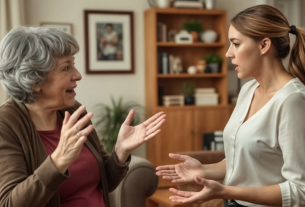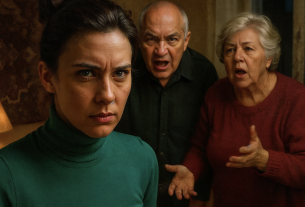Alla had been wiping the same cups for ten minutes already. Her thoughts were tangled, her hands were trembling. Pavel’s voice was still ringing in her ears:
“I’ve filed for divorce. The house will be mine, the money too. You understand yourself: everything’s in my name.”
Thirty-two years of marriage. Thirty-two! And all of it—erased with one sentence. He didn’t even say it over dinner, just tossed it out in passing while stuffing papers into his briefcase.
Her phone vibrated. Her son.
“Mom? How are you?” Dima’s voice sounded worried.
“I’m fine,” Alla swallowed the lump in her throat. “Everything’s fine.”
“Dad called me. Is it true?”
“Yes.”
“God, Mom, why are you so calm? He wants to… to divorce you!”
“And what am I supposed to do, Dima? Scream? Throw a fit?”
Alla put the cup on the shelf. For thirty-two years she had lined them up by size. Pavel liked everything in perfect order.
“He said the house and the accounts are his,” she said quietly.
“What?! How can he say that? You built everything up together!”
“Together…” Alla let out a bitter little laugh. “Everything’s in his name, Dima.”
The doorbell rang. It was her neighbor Vera, the only friend who hadn’t drifted away over the years of her and Pavel’s closed-off life.
“Allochka!” Vera hugged her impulsively. “Everyone already knows. That… that man of yours!”
“How?” was all Alla could manage.
“Lyuda from the second entrance saw him with some young thing. They were looking at an apartment in a new building. He told her straight out: ‘After the divorce we’ll move in here.’”
Alla leaned against the wall. Something inside her snapped.
“So he has… someone else?”
“You didn’t know?” Vera covered her mouth with her hand. “Oh, I’m such an idiot…”
That evening Alla didn’t sleep. She went through old photographs. Here was their wedding—her in a simple white dress, happy. Here was their first vacation—the sea, the sun. Little Dima. And the last five years—almost no photos together. Just Pavel at presentations and on business trips.
In the morning she discovered that the safe in Pavel’s study was open. He had taken all the documents. Even the ones for the house they had built together. She still remembered lugging bricks, choosing wallpaper, handing over her teacher’s salary…
“I can’t just give up,” she told her reflection in the mirror.
In the law office it was cool and smelled of coffee.
“My name is Olga Viktorovna,” the female attorney introduced herself. “Tell me about your situation.”
Alla spoke in fits and starts, constantly breaking off:
“I always thought… we were a family… I never kept track of the paperwork…”
“Many women do that,” Olga nodded. “But there’s good news. Even if everything is in your husband’s name, by law the property acquired in marriage is divided equally.”
“Really?” Alla looked up. “But he says…”
“And what else would he say?” Olga smirked. “Of course he’ll insist everything is his. That’s usually how it goes. Do you have any documents? Receipts? IOUs?”
At home Alla turned everything upside down. In an old box she found receipts for payments for building materials for the house, IOUs from Pavel when he “borrowed” money from her for his business. She had kept everything without even knowing why. A teacher’s habit—to save documents.
The phone rang again.
“What do you think you’re doing?” Pavel’s voice was icy. “Ran to a lawyer?”
“How did you—”
“Doesn’t matter. Listen, All,” his tone softened, “why do we need this war? Let’s split up peacefully. I’ll leave you a little money to get you started.”
“A little?” Alla gripped the phone tighter. “And what about half the house? Our joint business?”
“What joint business?” Pavel laughed. “What are you talking about? You’re a retired teacher, what business?”
“I invested money. I have IOUs.”
“IOUs?” his voice faltered. “What nonsense? Those were gifts.”
“Let’s discuss it in court,” Alla said suddenly, firmly, and hung up.
Her heart was pounding wildly. She had never spoken to him in that tone. She had always given in, agreed. For thirty-two years she had agreed. And now…
“Did I really just do that?” she whispered, and for the first time in many days, she smiled.
The next few weeks flew by in a kind of haze. Alla gathered documents, met with the lawyer, learned legal terms. At the college she took a leave of absence—she couldn’t concentrate on her lectures.
“Allochka, you’ve lost weight,” her colleague Marina noticed in the staff room. “Eat at least something.”
“No time,” Alla waved her off. “I have to get the paperwork ready.”
“Listen, and that man of yours… isn’t he threatening you?”
“So far only on the phone,” Alla winced. “He calls and says, ‘Come to your senses.’ As if I’m crazy, can you imagine?”
That evening her son called.
“Mom, he’s driving me crazy,” Dima’s voice sounded tired. “He calls every day, asks me to put pressure on you.”
“And you?”
“What about me? I said it’s between you two. He blew up.”
Alla sighed. Dima had always stayed out of her and Pavel’s problems. Maybe that was for the best.
“Mom, how are you, hanging in there?”
“I’m hanging in,” she swallowed the lump in her throat. “You know, I found some old photos. Remember when we were building the house? You were still little.”
“Of course I do! I was lugging bricks!” Dima laughed. “And Dad just bossed everyone around.”
“Uh-huh. And I was the one putting in the money.”
“What?”
“That’s right. My entire salary went on building materials. I even kept the receipts.”
“Wow! And he keeps saying he did everything himself…”
Her phone beeped—an incoming call from Pavel. Alla declined it.
“He’s calling again. It’s every day now.”
“Don’t pick up.”
“I don’t. But he still shows up.”
Yesterday Pavel had turned up without warning. He stood at the door, giving her the look that had always made her fall silent. It used to work. Now it didn’t.
“Give back the IOUs,” he demanded.
“No.”
“Alla, you’re playing with fire.”
“You’re the one playing, Pash. With me. For thirty-two years.”
He left, slamming the door so hard that plaster rained down.
And today she showed up. Young, well-groomed, with a brazen look.
“I’m Katya,” she introduced herself from the doorway. “We need to talk.”
“About what?” Alla crossed her arms over her chest.
“About Pavel. He’s suffering. You’re getting divorced anyway, so why make a circus out of it?”
“What circus?”
“Well, all these… claims of yours. To the house, to the money.”
“To my money,” Alla clarified.
“What do you mean, your money?” Katya rolled her eyes. “Pasha was the one running the business, and you…”
“And I what?”
The girl faltered.
“Well… a housewife.”
“I’ve been teaching at the college for thirty years.”
“Doesn’t matter!” Katya snapped. “Pasha and I love each other. And you…”
“How old are you, Katya?”
“Twenty-seven,” she replied defiantly.
“At twenty-seven I also thought everything was simple.” Alla sighed. “Tell Pavel I’ll see him in court.”
After Katya left, Alla stood in front of the mirror for a long time. Wrinkles, gray hair… No, she couldn’t compete with that girl. But was that really the point?
“I’m not fighting for youth,” she told her reflection. “I’m fighting for justice.”
Olga Viktorovna called in the evening.
“Alla Sergeyevna, the documents are ready. Tomorrow we file with the court.”
“So quickly?”
“Why drag it out? We have an ironclad position. By the way, your ex-husband called me.”
“And what did he want?”
“Threatened me,” the lawyer chuckled. “But I’m not the timid type. So, are you ready for the hearing?”
“No,” Alla answered honestly. “But there’s no choice.”
“That’s the right attitude,” approved Olga. “See you tomorrow.”
The courtroom turned out to be smaller than Alla had imagined. An ordinary room with wooden benches, the judge’s desk, and the coat of arms on the wall. She nervously fiddled with the strap of her bag and tried not to look at Pavel, who was sitting opposite her with a self-satisfied expression.
“Don’t worry,” Olga Viktorovna whispered. “We’ve got everything covered.”
“What if he comes up with something? You don’t know him…”
“I see ten of his type a day,” the lawyer smiled. “Look, he brought Anton Markin. A favorite of rich clients. But he can’t argue with the facts.”
The judge—a middle-aged woman with a tired face—entered the room.
“We are hearing the case of the division of property of the spouses Sokolov,” she quickly scanned the papers. “The plaintiff?”
“Pavel Nikolayevich Sokolov,” Pavel’s attorney stood up. “My client demands that the defendant’s claims to the property be dismissed as invalid, since all assets were acquired with his personal funds and are registered in his name.”
Alla clenched her fists. The nerve of him! She remembered how she’d scrimped on everything, handing over money for the house construction. How she’d taken on extra hours at the college to “invest in their future.”
“Defendant, your position?” the judge asked.
“Alla Sergeyevna does not agree with the plaintiff’s demands,” Olga Viktorovna said firmly. “The property was acquired during the marriage; the wife contributed her own funds and labor. We have evidence.”
Pavel snorted and whispered something to his lawyer. The lawyer nodded.
“What evidence?” the judge inquired.
Olga Viktorovna took out a folder:
“IOUs signed by Pavel Nikolayevich acknowledging receipt of funds from his wife for the construction of the house. Receipts for payment of materials from Alla Sergeyevna’s personal card. Statements from her account confirming regular withdrawals of large sums during the construction period. Witness testimonies.”
“What nonsense is this?” Pavel couldn’t hold back. “What IOUs? It was so long ago, I don’t even remember!”
“Order in the court,” the judge said sternly. “You will speak when you are asked.”
Olga handed the documents to the judge. She studied them carefully.
“We call the witness Dmitry Sokolov.”
Dima entered the courtroom. He was visibly nervous.
“Dmitry, can you confirm that your mother contributed funds to the construction of the house?”
“Yes,” he nodded. “I was still little then, but I remember how Mom kept taking money to the construction site. She’d say, ‘This is my salary, for the materials.’”
“It’s all made up!” Pavel jumped up again. “He’s just covering for his mother!”
“Sokolov, one more remark and I’ll have you removed from the courtroom,” the judge snapped.
Then other witnesses spoke. Neighbor Vera told how Alla had taken out a loan for the down payment on the house. A colleague from the college recalled how Alla had tutored on the side “for the bathroom tiles.”
With each witness, Pavel grew darker. His lawyer flipped feverishly through the papers.
“And now I would like to present one more document,” said Olga Viktorovna, taking out a yellowed sheet. “This is a power of attorney from Alla Sergeyevna to her husband to manage affairs in his firm. And here is a bank statement confirming that the initial capital for the business was deposited from her savings account.”
A hush fell over the courtroom. Pavel turned pale.
“Where did you get that?” he hissed.
“From the bank archive,” Olga replied calmly. “Information is kept for a long time.”
The court retired to deliberate. Alla sat motionless, afraid to believe that everything was going so well.
“Will we win?” she whispered.
“We already have,” Olga winked. “The judge has no choice. The law is on our side.”
Half an hour later the judge returned and read out the ruling:
“To recognize the right of Alla Sergeyevna Sokolova to half of the jointly acquired property, including the residential house, bank accounts, and a share in the business…”
Pavel leapt to his feet:
“This is impossible! I’ll appeal!”
“Feel free,” the judge nodded imperturbably. “But the decision will remain in force.”
Six months passed.
Alla sat in the kitchen of her half of the house, kneading cake batter. After the division of property, she and Pavel had officially registered the house as two separate residences with different entrances. At first it had been strange, but then she got used to it. And Pavel hardly ever showed up—he was living with his Katya.
Her phone beeped—a pastry order from the nearby café. Another cake for tomorrow. Alla smiled. Who would have thought that her baking hobby would turn into a small business?
The doorbell rang. Dima stood on the threshold with a huge bouquet.
“Happy birthday, Mom!”
“Oh, Dimochka!” She hugged her son. “Thank you, sweetheart!”
“How are you? I see you’re baking again?” he nodded at her flour-dusted hands.
“Loads of orders! Can you imagine, I’m booked up two weeks in advance!”
“You’re something else!” Dima settled at the table. “And your old man doesn’t bug you?”
Alla stirred the cream in the bowl.
“He came by last week. Said he’d had a fight with Katya.”
“And?”
“He wanted to move back in, can you imagine?” she snorted. “He says, ‘All, why did we split up like fools? Let’s put everything back the way it was.’”
“And you?”
“And I told him, ‘Pash, it’s too late. I’ve only just found myself.’”
Dima laughed with satisfaction and pinched off a piece of dough.
“Mom, I’m really proud of you. Seriously. I never thought you’d be able to turn everything around like this.”
“I didn’t think so myself,” Alla looked out the window. “You know, sometimes something bad happens, and later you realize—it was for the best.”
In the evening guests arrived—colleagues from the college, new friends from her baking club, neighbor Vera. Alla laid the table in her renovated living room. After the divorce she had redone the place—light wallpaper instead of dark, new furniture. Pavel had always liked heavy curtains and bulky cabinets. She had wanted light and space.
“To the birthday girl!” Vera raised her glass. “To our heroine!”
“Oh, what kind of heroine am I,” Alla said shyly.
“A real one!” Marina from the college chimed in. “So many women just endure and are afraid to change anything. But you did it!”
After the guests left, Alla sat on the sofa with a cup of tea. The doorbell rang again. Pavel stood on the threshold with a box of chocolates.
“Happy birthday,” he muttered.
“Thank you,” she said, without inviting him in.
“Can we talk?”
“About what?”
“I miss you, All.”
She looked closely at her husband. He had aged, grown gaunt. But his eyes were the same—sly, calculating.
“What about Katya?”
“We broke up. She’s… not the right one.”
“And I am the right one, then?” Alla smiled wryly. “Pash, it’s too late. I have my own life now.”
“What life? Baking cakes?” he sneered.
“Cakes too. And I’ve made new friends. I’ve joined a choir. And overall… I’m doing well.”
“Without me?”
“Imagine that,” she smiled calmly. “For thirty-two years I lived for you. Now I want to live for myself.”
Pavel silently handed her the chocolates and left. Alla closed the door and leaned her back against it.
“I did it,” she whispered. “I really did it.”
In the morning she woke up to the sound of her phone. A new order—a wedding cake for thirty people.
“Can you have it ready by Saturday?” the girl asked.
“I can,” Alla answered confidently. “Now I can do anything.”
She opened the window. The spring sun flooded the room. So many plans lay ahead—pastry courses, a trip to the seaside with her friends, meeting the grandchild Dima was expecting.
“Who would have thought,” Alla smiled, looking up at the sky, “that at fifty-five life is only just beginning.



